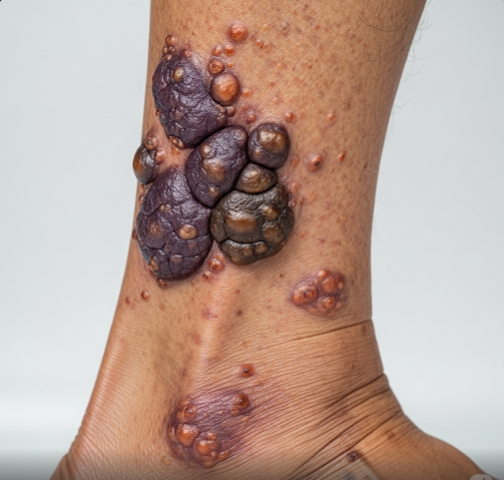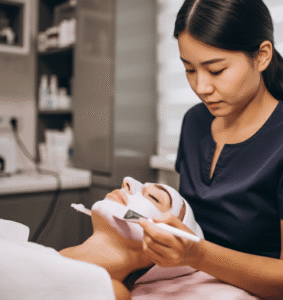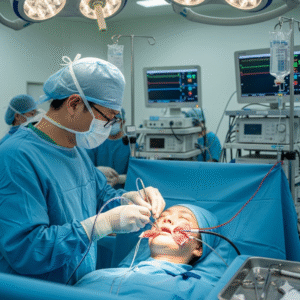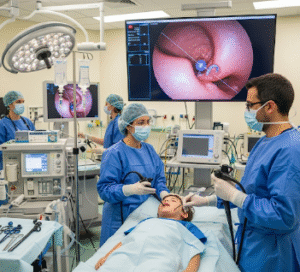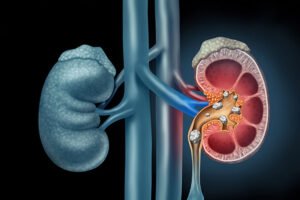Overview
Kaposi Sarcoma (KS) is a rare type of cancer that develops from the cells lining blood or lymph vessels. It typically appears as tumors on the skin or mucous membranes but can also affect internal organs. KS is caused by infection with the human herpesvirus 8 (HHV-8), also known as Kaposi sarcoma-associated herpesvirus (KSHV). It is more common in people with weakened immune systems, such as those with HIV/AIDS or organ transplant recipients. Korea offers advanced diagnostic and treatment options for KS, combining modern oncology care with specialized therapies.
What Is Kaposi Sarcoma?
Kaposi Sarcoma is a vascular cancer characterized by abnormal growth of blood vessel cells, leading to lesions that may be purple, red, or brown. These lesions can appear on the skin, inside the mouth, lymph nodes, or other organs. KS is classified into several types based on the population affected: classic (older adults), endemic (in parts of Africa), epidemic (HIV/AIDS-related), and iatrogenic (immunosuppression-related).
Symptoms
- Purple, red, or brown patches, plaques, or nodules on the skin or mucous membranes
- Swelling or lymphedema, especially in the legs
- Lesions in the mouth or throat causing discomfort or difficulty swallowing
- Shortness of breath or cough if lungs are involved
- Abdominal pain or gastrointestinal bleeding if internal organs are affected
Causes
Kaposi Sarcoma results from infection with HHV-8. The virus alone is not sufficient to cause KS; immunosuppression or other cofactors are typically needed to trigger tumor development. Major causes include:
- HHV-8 infection
- Immune system suppression (e.g., HIV infection, organ transplantation, immunosuppressive drugs)
Risk Factors
- HIV/AIDS infection or other causes of immunodeficiency
- Organ transplant recipients on immunosuppressive therapy
- Older age (classic KS)
- Geographic factors (higher rates in certain regions like sub-Saharan Africa)
- Infection with HHV-8
Complications
- Extensive skin lesions leading to discomfort, pain, and cosmetic issues
- Lymphedema causing swelling and mobility problems
- Organ involvement that can impair function (lungs, gastrointestinal tract)
- Secondary infections in affected areas
- Impact on overall health and quality of life
Prevention
- Preventing HHV-8 infection (though no vaccine exists, reducing exposure risk through safe practices is advised)
- Effective management of HIV infection with antiretroviral therapy (ART) to maintain immune function
- Careful monitoring and adjustment of immunosuppressive therapies in transplant patients
- Early detection and treatment to avoid progression
Treatment Options in Korea
Korea provides comprehensive care for Kaposi Sarcoma, including:
- Antiretroviral Therapy (ART): For HIV-associated KS, controlling HIV is critical.
- Chemotherapy: Systemic treatments like liposomal doxorubicin or paclitaxel are used for widespread disease.
- Radiation Therapy: Effective for localized skin or mucosal lesions to reduce tumor size and symptoms.
- Surgical Removal: For isolated lesions, surgical excision may be an option.
- Immunotherapy and Targeted Therapies: Emerging options in specialized centers.
- Supportive Care: Managing symptoms such as swelling and infections.
Korean hospitals combine cutting-edge technology, expert oncologists, and personalized care to optimize outcomes for KS patients. Advanced diagnostics such as PET scans, molecular testing, and multidisciplinary management teams ensure precise treatment plans.

